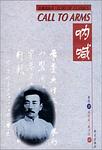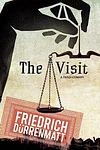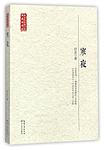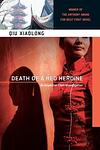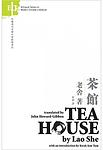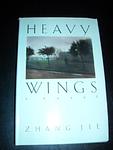The Greatest Chinese, Swiss "Fiction" Books Since 1900
Click to learn how this list is calculated.
This list represents a comprehensive and trusted collection of the greatest books. Developed through a specialized algorithm, it brings together 300 'best of' book lists to form a definitive guide to the world's most acclaimed books. For those interested in how these books are chosen, additional details can be found on the rankings page.
Genres
Countries
Date Range
Reading Statistics
Click the button below to see how many of these books you've read!
Download
If you're interested in downloading this list as a CSV file for use in a spreadsheet application, you can easily do so by clicking the button below. Please note that to ensure a manageable file size and faster download, the CSV will include details for only the first 500 books.
Download-
1. Call to Arms by Xun Lu
"Call to Arms" is a collection of short stories that vividly capture the impact of the socio-political upheaval during the early 20th century in China. The narratives delve into the lives of ordinary people, predominantly the peasantry and the lower classes, who are often caught in the throes of societal change and struggle for survival. Through a blend of realism and symbolism, the stories explore themes of tradition versus modernity, the human condition, and the quest for justice, reflecting the author's critical engagement with the national and cultural issues of his time.
-
2. I'm Not Stiller by Max Frisch
The book is a profound exploration of identity and the human condition, revolving around a man who is arrested upon his return to his home country, Switzerland, after spending time in America. Although he insists he is not the man, Stiller, that everyone believes him to be, his protests are ignored. The story unfolds as he writes in his prison cell, reflecting on his past life and relationships, and grappling with the question of who he truly is. It's a thought-provoking narrative that challenges conventional notions of selfhood and personal identity.
-
3. Jakob Von Gunten by Robert Walser
This novel is a first-person account of a young man who leaves his privileged life to enroll at a school for servants in Berlin. The protagonist's observations and experiences in the school, his interactions with the headmaster and other students, and his internal struggles and reflections form the crux of the story. The narrative, imbued with irony and dark humor, explores themes of power, submission, individuality, and the absurdity of societal norms and expectations.
-
4. Belle du Seigneur by Albert Cohen
"Belle du Seigneur" is a tragic love story set in the 1930s, revolving around a high-ranking Jewish official who works for the League of Nations and his passionate affair with a married Swiss aristocrat. The narrative delves deep into their intense relationship, exploring themes of obsession, self-destruction, and existential despair, all set against the backdrop of the impending Second World War. The novel is also notable for its satirical portrayal of diplomatic life and its exploration of Jewish identity.
-
5. Homo Faber by Max Frisch
"Homo Faber" is a novel about a man named Walter Faber, a highly rational and logical Swiss engineer who believes strongly in technology and progress. His life is turned upside down when he survives a plane crash in the Mexican desert, falls in love with a young woman who turns out to be his daughter, and then loses her to a tragic death. This series of events forces him to question his faith in technology and confront the irrationality of life.
-
6. Rickshaw Boy by Lao She
"Rickshaw Boy" is a novel about a young man living in Beijing in the 1920s who struggles to escape poverty and achieve personal independence. Despite his hard work and determination, he is continuously set back by societal and personal misfortunes, including failed business ventures, a disastrous marriage, and the loss of his rickshaw. The book serves as a critique of traditional Chinese society, illustrating the harsh realities of life for the working class during this time period.
-
7. Waiting by Ha Jin
"Waiting" is a story set in China during the Cultural Revolution and its aftermath, revolving around the life of Lin Kong, a military doctor who is torn between his love for two women. He is stuck in an arranged marriage with his traditional wife in the countryside, while he falls in love with a modern, city nurse. The novel explores his 18-year struggle to divorce his wife and marry his lover, depicting the clash between traditional and modern Chinese culture, personal desires, and societal expectations.
-
8. Balzac and the Little Chinese Seamstress by Dai Sijie
This novel tells the story of two teenage boys sent to a remote mountain village for re-education during China's Cultural Revolution. There, they meet a local tailor's daughter, who becomes their friend and the object of their shared affection. The boys discover a hidden suitcase filled with forbidden Western classics in Chinese translation, and their lives are forever changed. The books not only awaken their passion for literature, but also allow them to educate the Seamstress, ultimately leading to a heartbreaking love triangle and a tale of personal freedom against the odds.
-
9. The Three-Body Problem by Cixin Liu
The book is a science fiction novel that intertwines the cultural revolution of China with a complex narrative involving astrophysics, virtual reality, and alien contact. It follows a disillusioned scientist who, after suffering personal tragedy during the Cultural Revolution, sends a message into space, only to receive a response from an alien civilization on the brink of destruction. As the aliens plan their migration to Earth, a secret organization works to facilitate the invasion, while a disparate group of scientists and military personnel attempt to understand and prevent the impending extraterrestrial crisis. The novel grapples with themes of human nature, technological advancement, and the vast, often incomprehensible universe.
-
10. Moravagine by Blaise Cendrars
The novel follows the adventures of an eccentric, violent, and mentally unstable protagonist who is released from an asylum by his psychiatrist. The pair embark on a chaotic journey across Europe and America, encountering a variety of strange and often dangerous situations. The narrative explores themes of insanity, violence, and the human condition, offering a dark and surreal critique of modern society.
-
11. The Pledge by Friedrich Dürrenmatt
This book is a gripping crime story that delves into the complexities of human nature and the limitations of the justice system. It follows the journey of a retired police detective who becomes obsessed with solving the murder of a young girl, promising the victim's parents to find the perpetrator. As he delves deeper into the investigation, his methods become increasingly unconventional, straying from standard police procedure and relying instead on a meticulously crafted plan to catch the killer. The narrative challenges the conventional detective story format, exploring themes of obsession, the unpredictability of life, and the moral ambiguities of justice, ultimately questioning whether the ends justify the means in the pursuit of truth.
-
12. Man in the Holocene by Max Frisch
The book is a narrative about an elderly man who, isolated in his home during a rainstorm in the Swiss Alps, reflects on his life, mortality, and the human condition. The protagonist spends his time reading encyclopedic entries and clipping them to his wall, creating a mosaic of human knowledge and history. The narrative is interspersed with these entries, presenting a blend of fiction and non-fiction, and exploring themes of memory, time, and the fleeting nature of human existence.
-
13. The Judge and His Hangman by Friedrich Dürrenmatt
This book is a crime novel set in Switzerland, where a police lieutenant is tasked with solving the murder of his former colleague. The narrative explores themes of justice, revenge, and the blurred lines between good and evil. The lieutenant, despite being terminally ill, is determined to solve the case and in the process, he uncovers a web of corruption and deceit that forces him to question his own morality and the nature of justice. The story is a philosophical examination of the criminal justice system and the moral dilemmas faced by those who enforce the law.
-
14. Cold Nights by Ba Jin
"Cold Nights" is a poignant love story set in the backdrop of China's turbulent political climate during the 1940s. The narrative follows the protagonist, Wan Da, as he navigates through the hardships of life, love, illness, and death. As his wife, Zhenzhen, falls ill with tuberculosis, Wan Da's struggle to secure medical help for her amidst the chaos of war paints a vivid picture of human endurance and the power of love. The book also explores themes of existentialism and the human condition, offering a profound look at life's hardships and the strength of the human spirit.
-
15. Death Of A Red Heroine by Qiu Xiaolong
"Death Of A Red Heroine" is a crime novel set in 1990s Shanghai, China. The story follows Inspector Chen Cao as he investigates the murder of a young woman, whose body is found in a canal. As Chen delves deeper into the case, he uncovers a web of corruption, political intrigue, and personal secrets that challenge his loyalty to the Communist Party and force him to confront the complexities of modern Chinese society. Through vivid descriptions of Shanghai's changing landscape and insightful commentary on social issues, the novel offers a captivating portrayal of a country in transition.
-
16. A Hero Born by Jin Yong
"A Hero Born" is the first installment in an epic martial arts saga set in the Song Dynasty of China, where the story follows the life of Guo Jing, a young boy from a humble background. After his father, a loyal Song patriot, is murdered, Guo Jing is raised by Genghis Khan in the Mongolian steppes. Throughout his adventures, he encounters a diverse cast of characters, learns from legendary martial arts masters, and is imbued with the values of honor, loyalty, and the complex moralities of warfare and brotherhood. His destiny is intertwined with the fate of his nation as he embarks on a quest to become a true hero and to confront formidable enemies that threaten the very fabric of the martial arts world.
-
17. Teahouse by Lao She
"Teahouse" is a historical drama that explores 50 years of Chinese history (1898-1948) through the microcosm of a Beijing teahouse. The narrative follows the lives of the teahouse owner and his customers, reflecting the social changes, political turmoil, and cultural shifts of the time. The story provides a deep insight into the Chinese society, its traditions, and the impact of Western influence. It also highlights the struggle of the common people amidst corruption, oppression, and the collapse of traditional values.
-
18. Heavy Wings by Zhang Jie
"Heavy Wings" is a novel that explores the societal changes in China during the late 20th century. It follows the story of a group of innovative engineers striving to design and build China's first large-scale commercial aircraft. Despite facing numerous challenges such as lack of resources, political interference, and personal struggles, they remain committed to their mission, symbolizing the spirit of perseverance and innovation. The story is a reflection of China's journey towards modernization and technological advancement.
-
19. Half of Man is Woman by Zhang Xianliang
This novel provides a deeply personal account of the author's experiences during China's Cultural Revolution and his subsequent imprisonment in a labor camp. The protagonist struggles with the harsh realities of his imprisonment, including starvation and physical abuse, while also grappling with his own identity and the societal expectations of masculinity. His release and subsequent marriage only further complicate his quest for self-understanding, as he navigates the challenges of reintegrating into society and maintaining a relationship with a woman who has her own traumatic past.
-
20. Cat Country by Lao She
This novel is a satirical science fiction tale that transports the reader to Mars, where the protagonist, a Chinese man, finds himself stranded in a society inhabited by cat-like humanoids. The narrative delves into the peculiarities and dysfunctions of this Martian civilization, known as Cat Country, highlighting its inhabitants' indolence, corruption, and societal decay. Through the lens of this alien society, the author critiques various aspects of early 20th-century Chinese society, politics, and culture, using the allegorical Cat Country to reflect on human follies, the dangers of political apathy, and the consequences of societal neglect. The story is both a unique exploration of extraterrestrial life and a poignant commentary on the human condition.
-
21. Miss Sophie's Diary And Other Stories by Ding Ling
This collection of stories offers a poignant glimpse into the lives of Chinese women in the early 20th century, grappling with issues of personal freedom, gender roles, and societal expectations. The titular story, written in diary form, provides an intimate look at the emotional turmoil of a young woman confronting her own desires and the constraints placed upon her by traditional norms. The other narratives in the collection similarly explore the inner lives and struggles of women seeking to define themselves in a rapidly changing world, often touching on themes of love, independence, and self-discovery. Through these stories, the book paints a vivid portrait of the complexities of modern womanhood in a society in transition.
-
22. Love In A Fallen City by Eileen Chang
"Love in a Fallen City" is a collection of novellas and short stories that delve into the complexities of love, betrayal, and societal expectations in mid-20th century China. The stories primarily focus on women navigating the challenging terrain of romance and marriage in a rapidly changing society. The titular story captures the tumultuous relationship between a divorced woman and a playboy against the backdrop of World War II, exploring themes of survival, traditional values, and personal transformation. Through elegant prose and deep psychological insight, the book portrays the collision of Eastern and Western cultures and the personal struggles of individuals caught in the throes of historical upheaval.
-
23. My City: A Hong Kong Story by Xi Xi
"My City: A Hong Kong Story" is a compelling narrative that provides an intimate exploration of Hong Kong through the author's eyes. The author weaves a rich tapestry of the city's unique culture, history, and identity, drawing on personal experiences, observations, and a deep love for the city. The book is a poignant tribute to Hong Kong, presenting the city's transformation over the years and the challenges it faces, while also highlighting its resilience and spirit.
-
24. Love Must Not Be Forgotten by Zhang Jie
The narrative explores the complexities of love and memory through the lens of a woman who discovers her deceased mother's diary, which reveals a poignant and secret love affair. As the daughter delves into the pages, she confronts her own romantic dilemmas and the societal pressures of 1980s China. The story weaves together themes of personal freedom, the weight of traditional expectations, and the enduring impact of love across generations, prompting the protagonist to reflect on her life choices and the possibility of happiness in her future relationships.
-
25. Spring Moon by Betty Bao Lord
Set against the backdrop of a changing China from the late Qing Dynasty through the Cultural Revolution, the novel follows the life of Spring Moon, a young noblewoman of the Soong family. As she navigates the complexities of tradition and modernity, Spring Moon experiences personal tragedies and triumphs while witnessing the seismic shifts in Chinese society. Her story is one of love, loss, and resilience, reflecting the broader historical forces at play that reshape her country and her family's destiny. Through her eyes, readers experience the clash of old values with new ways, and the struggle to find harmony amidst chaos.
Reading Statistics
Click the button below to see how many of these books you've read!
Download
If you're interested in downloading this list as a CSV file for use in a spreadsheet application, you can easily do so by clicking the button below. Please note that to ensure a manageable file size and faster download, the CSV will include details for only the first 500 books.
Download